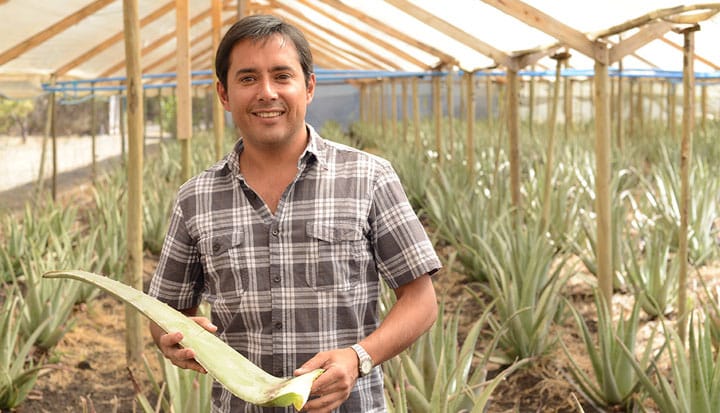Image: Cristian Leger, founder of Dermaloe in Chile, who received entrepreneurship support from Accion Emprendedora – a member of YBI
With 3.5 billion young people in the world, its clear that the Sustainable Development Goals will not be met without a clear focus on youth.
There has been a lot of discussion about how we can involve young people in the implementation of the SDGs, with Ban Ki-Moon describing young people as the “torch-bearers” for the SDGs.
But new research, published by Youth Business International and our partners Restless Development and War Child, reveals that the space for young people is increasingly restricted.
The report, From Rhetoric to Action, illustrates some of the barriers that young people, and the organisations that exist to support them, face.
Just a few examples: former child soldiers in Colombia facing discrimination as they search for work; harassment of youth movements in Mexico; and low personal freedoms and work opportunities for young women in India. The report finds that the conditions for effective youth development, particularly in the areas of livelihoods, participation, and protection, are simply not in place.
These findings are extremely concerning, but perhaps not surprising given other reports of a global clampdown in civil spaces and freedoms. Right now, when we need leadership from young people the most, we’re doing the least to help them grow, and in many cases actively restricting their freedoms.
From Rhetoric to Action also has some insights around how youth organisations engage with the private sector.
Recognising the important role that the private sector has in helping to implement the SDGs, an overwhelming majority of 800 youth organisations and movements we surveyed said that they would like to build greater partnerships with the private sector.
Unsurprisingly, the reasons are primarily around funding – but a number of respondents also said that they were seeking non-financial resources from businesses, such as skills and guidance. This is of course particularly true in the area of livelihoods, as job creation, and the provision of employability skills, are challenges that businesses are well placed to address.
Not all respondents, though, responded so positively. Some indicated their nervousness about developing partnerships with the private sector, expressing concern about the potential for conflicts of interest. For these respondents, governments and foundations are preferred as funders – demonstrating that the private sector still has some way to go to build up trust with some youth organisations.
Of course, in many countries, young people are building the private sector for the future, through entrepreneurship.
Some 73 million young people are currently unemployed, and over the next decade, only one job will be created for every four young people entering the labour market.
For the vast majority of young people living in developing countries, formal sector employment is limited or non-existent, and so the best chance for an improved livelihood is often self-employment.
From Rhetoric to Action calls for policies that encourage employability or business skills – often outside the formal education curriculum – that can make the difference for a young person getting a job or starting up a business.
As a network of more than 40 organisations helping young entrepreneurs to start up and grow, Youth Business International has a lot of experience in how to do this.
From our member in Uganda, Enterprise Uganda, running training initiatives in rural areas that help young people to develop entrepreneurial attitudes, to Dutch NGO Qredits teaching entrepreneurship skills in schools and colleges, the format of these programmes differs greatly around the world.
Each programme needs to be designed to take into account different factors: what kind of people are we supporting? How popular is self-employment in the region where we are focusing? Is there a need to give young people more entrepreneurial attitudes? Or is it more about business skills?
But they all have a common purpose: providing young people with the attitudes and business skills that enable them to create their own business.
We know that we need to do a lot more of this in coming years to give young people greater work opportunities, and address the growing youth unemployment crisis.










